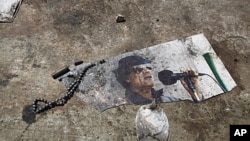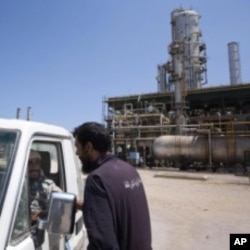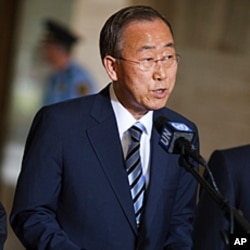Moammar Gadhafi’s final days are fast approaching. Libyans have demanded their freedom and won. However, the rebels have a long way to go to turn 42 years of dictatorship into a functioning democracy. Experts foresee daunting challenges ahead to build a Libyan state from the ground up.
Gadhafi leaves behind a country with few modern state institutions. He managed to deprive Libya of almost all recognizable elements of political life, such as competing political parties or a parliament that challenges the will of the country’s leader. That will make it difficult for the transitional government to build effective political and public institutions from the old regime. So the only course of action appears to build something brand new from nothing.
Hany Khallaf is a former Egyptian ambassador to Libya. He said that throughout his reign Gadhafi discredited and crushed any political opposition and prevented any form of civil society organizations from taking hold. “The dictatorship legacy will necessitate building a political structure from scratch,” said Khallaf.
Libya's key players
The single-sector economy presents other problems. Ninety five percent of Libya’s export earnings comes from oil, which amounts to 80 percent of government revenues. With a population of about 6.5 million, and domestic production of about $62 billion, Libyans should have one of the highest per capita earnings in Africa. But they don’t.
Libya’s wealth under Gadhafi never trickled down. As Ambassador Khallaf explains, “The richness of Libya has been altogether concentrated within the hands of the 1,000 people at the top, including Gadhafi and his family as well as leaders of the revolutionary cells loyal to him.” “The ordinary Libyan citizen was provided with modest housing and poor quality education and health care,” he added.
Real challenges for transition
With a wide spectrum of opposition factions - such as Berber tribes in the south or the Muslim Brotherhood - unification of the country by the rebels is a major task. Transitional justice based on due process and not tribal retribution is another challenge. In addition, rebuilding the infrastructure and the Libyan institutions that can provide it will require effort and investment.
There is such a long list of challenges, it is difficult to know which one to tackle first? For Elliott Abrams, former senior director of the National Security Council for Near East and North African Affairs, maintaining political unity is a top priority, but Libyans will judge the transition based how it meets the people’s expectations.
“Libyans will judge the post-Gadhafi era by whether their lives seem to get better and whether their daily needs are met and whether law and order can be maintained to pave the way for transition to representative democratic governance,” said Abrams.
|
The Libyan Rebellion
|
But for Anis Elsharif, a rebel leader based in Tripoli, the first transition challenge facing Libya is to overcome the legacy of 42 years of dictatorship by replacing Gadhafi’s personal network of loyalists and the so-called popular committees with effective state institutions.
“There is a need for an election of an inclusive national assembly from which a constitutional committee will be formed to draft a new constitution,” Elsharif said. “New parties need to be formed to replace “the tribal divisions that Gadhafi used to stay in power.”
Ambassador Khallaf argues that tackling any potential rift among rank and leadership of the Transitional National Council, building unity and preventing counter insurgency are all essential.
“The most crucial challenge is the security control over the armed forces, communication centers, the central bank, air and sea ports and securing borders with neighboring countries,” he said. “Also, all paramilitary forces such as the revolutionary cells should be disarmed and rebel fighters should be given incentives to surrender their arms to the transitional government.”
The courts must guarantee fair trials based on due process, he added. “For a stable transition, it is imperative to have fair trials for the political figures of the former regime. Libyan traditions provides for one aspect of transitional justice which is paying reparations for victims of regime’s oppression,” Khallaf said.
But Anthony Cordesman, a leading expert on the Middle East at the Center for International and Strategic Studies in Washington, pointed out Libya’s oil industry faces some of the most crucial challenges.
“There is a need to immediately act to deal with the problems in the petroleum sector because that is vital to both most of the government revenues and to any effort to rebuild and develop the emerging democracy,” he said. “There is also a need to create an economic structure that tackles the high unemployment rate and provides stability through a better distribution of the national wealth.”
Prospects on horizon
The unique way that Libya’s revolutionaries dismantled a 42-year dictatorship and the depth of their personal sacrifices provide motivation for the job that lies ahead. But their success will depend on how the transition is implemented, said Abrams. “Libya has only about 6.5 million people with lots of oil revenues so they should be able to recover, but the trick is going to be able to build the political institutions, maintain law and order and reform their economic system.”
Ambassador Khallaf is optimistic.“Libya has huge reserves of oil and natural gas for at least 50 years,” he said. “If the government modernizes its oil industry it can add tremendous revenues. Also, the vast North coast area stretching over 2,000 kilometers could provide ample resources for organized fishing, maritime activities and tourism.”
Middle East expert David Pollack of the Washington Institute for Near East Policy said several Middle Eastern neighbors may play a role in Libya’s future, especially Tunisia which was the first country in the Arab Spring. “The absence of neighbors’ interference in a destructive way and the continued international support that the Libyan rebels are receiving ensure a better future for Libya,” said Pollack.
Libya is about to get some international support for its reconstruction. U.N. Secretary-General Ban Ki-moon promised to assist Libya in five vital areas, including: security and the rule of law; socio-economic recovery; constitution-making and the electoral process; human rights and transitional justice; and coordination of support from Libya’s neighbors and the international community.
Meanwhile, the United States is leading an effort at the Security Council to release billion dollars of frozen Libyan assets to help the transition.
Ambassador Khallaf emphasized the important role Libyans abroad will play. “Hundreds of thousands of professional Libyans all over the world could help a lot in the economic and social development in Libya. They can enrich scientific research and modernize technology in Libya.”
Experts agree that both the international community and Libyan expatriates could - and - lend a big helping hand to replace Ghadafi’s Libya and a modern and prosperous Libya.



















